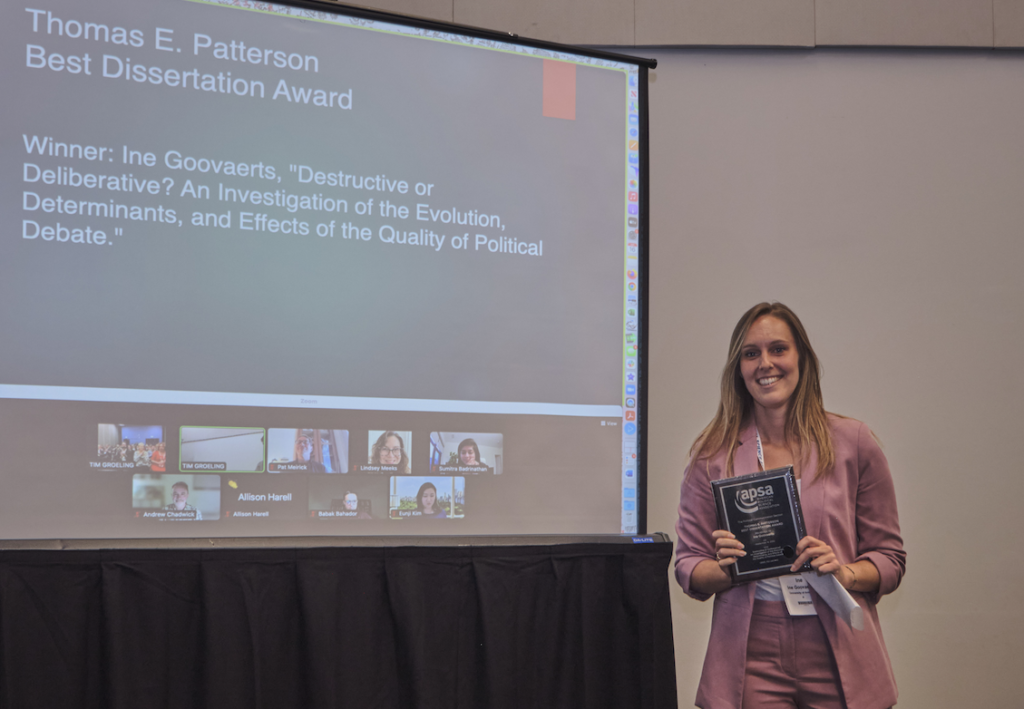PCR Awardee Questionnaire: Thomas E. Patterson Best Dissertation Award (2022)
Name(s) & affiliation:
- Ine Goovaerts (University of Antwerp, Belgium)
Project title:
- Destructive or Deliberative? An Investigation of the Evolution, Determinants, and Effects of the Quality of Political Debate
Publication reference, link (APA 7th):
- Goovaerts, I. (2021). Destructive or Deliberative? An investigation of the Evolution, Determinants, and Effects of the Quality of Political Debate. PhD Dissertation. Leuven: KU Leuven. https://lirias.kuleuven.be/retrieve/633111
Tell us something about you/your team and how and why you decided to focus on this research
- I have always been passionate about the interplay between communication and politics. After graduating in communication sciences, I pursued an additional master in political sciences, and decided to write a master thesis that combined both fields. I studied whether the effects of political personalization in the news play out differently for male versus female politicians, and so it began… my interest in doing research in the pol comm field got sparked a lot! Not really knowing back then what doing a PhD precisely entails, I was lucky that in that moment, my supervisors told me about a PhD position that opened in the research group of my supervisor Sofie Marien. And so I applied and got hired! During that time, events like Brexit and the Trump election led to many concerns about today’s quality of the political debate. Wanting to understand this better, my PhD journey led to writing a dissertation about the evolution (1985-2019), determinants and effects of politicians’ use of rude and simplistic statements in the western European context of mediated political debates.
In 280 characters or less, summarize the main takeaway of your project.
- Contrary to many concerns, politicians’ use of uncivil and simplistic statements did not systematically increase over time, at least not in televised debates. Rather, its use is highly context-dependent, and when politicians turn to it, they do not win much: they are generally trusted less and not perceived as more convincing.
What made this project a “polcomm project”?
- The combination and connection of different literatures from political sciences, communication sciences, and political communication (e.g. incivility literature, deliberative democratic theory, populism literature, etc.), as well as the research focus itself on politicians’ communication styles in mediated communication outlets (e.g. election debates).
What, if anything, would you do differently, if you were to start this project again? (What was the most challenging part of this project? …& how did you overcome those challenges?)
- One of the challenges I bumped into was to keep the overview of the many different studies and literatures that my PhD topic and studies connected to. After some time, I figured that I had to find some ways to deal with this. One such thing that helped me was creating a OneNote file that I structured into themes and sub-themes, to keep an overview of the different literatures/studies I was reading. So, if I would start a PhD again, I would think earlier on about tools that could help me to deal with feelings of literature overload.
What other research do you currently see being done in this field and what would you like to see more of in the future?
- So many important things to do/keep on doing! If I would have to name one research topic, I believe it is important that the field continues studying individual and societal-level causes and consequences of hate speech and violent rhetoric in different (online and offline) contexts and settings. This is not only important from a scientific point of view, but also from a societal point of view. The research findings could feed into societal debate and societally relevant tools or applications that can deal with or lower the use of hateful or violent rhetoric in the public and political sphere.
What’s next? (Follow-up projects? Completely new direction?)
- After finalizing my PhD at KU Leuven, I started a post-doc position at the University of Antwerp. In my post-doc, I am working on and involved in an exciting combination of new projects as well as follow-up projects. More specifically, I am a researcher on and a co-coordinator of an inter-university project between different Belgian universities (project: “NOTLIKEUS”). In this project, we study causes and consequences of citizens’ perceptions of differentness towards other-minded people and polarization in society. Moreover, I am also still engaged with studies on (violations of) communication norms in the public and political debate. I am very happy to be involved in these research projects in the next few years, and let’s see later what the further future brings for me!
PCR Awardee Questionnaire: Thomas E. Patterson Best Dissertation Award (2022)

